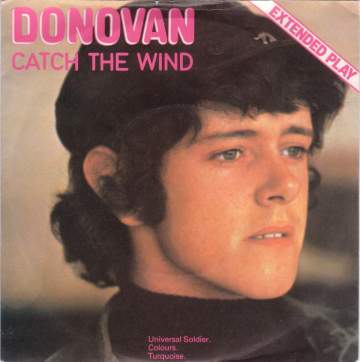|
Although born in Scotland Donovan's family had moved to Hatfield, just north of London while he was a child. He was still in his teens when he decided to make the break from art college for a career in music and began to spend his time travelling the UK singing and writing songs and taking odd jobs where necessary to make ends meet. Donovan's fortunes began to change when he made the acquaintance of Geoff Stephens with whose assistance he cut his first demo at a Denmark Street studio. Through this he gained a chance to appear on TV's 'Ready, Steady, Go!' and a recording contract with Pye soon followed. With a style influenced by Woody Guthrie, a denim blue cap and an acoustic guitar carrying the message that 'This machine kills' he was instantly seen as a rival to Bob Dylan who was gaining popularity in the UK at about the same time. The young Donovan's early professional career was guided by tin pan alley's Geoff Stephens and Peter Eden, but Donovan soon became unhappy with their management and by the end of 1965 had taken steps to rid himself of their involvement. By early 1966 his recordings were being produced in conjunction with Mickie Most whose reputation in that sphere was at a peak. One of their first efforts was 'Sunshine Superman' which went to #1 in the USA and was Donovan's best UK placing at #2. Like Bob Dylan, Donovan's recordings made increasing use of electric guitar work, but unlike his American rival he remained firmly associated with the acoustic format for most of his chart career. The comparisons with Dylan were overstated and thoroughly unfair, but totally inevitable. In any event, Donovan was an accomplished songwriter with his own style and a musical output that struck a far more optimistic note than his American counterpart. |
|
 |
My collection doesn't include many Donovan EPs, although, like almost anybody who has made any effort to collect Donovan 45s, I have the ubiquitous "Universal Soldier",. However, this Pye re-issue EP on FBEP107 has such a good picture of the great singer that I've chosen to put that on instead. |
| As the 1970s dawned Donovan's long spell at the top came to an end. Despite the long string of hits that he had behind him Donovan decided to end his collaboration with Mickie Most. The singer was probably too strongly identified with the trappings of the late sixties and the flower people movement in particular to be taken seriously by a new audience. Despite several reunions with Most, the next twenty years were not a very fruitful period for the minstrel from Hertfordshire. However, his music mounted a renaissance during the 1990s when he finally managed to introduce his talents to a new younger audience. | |
